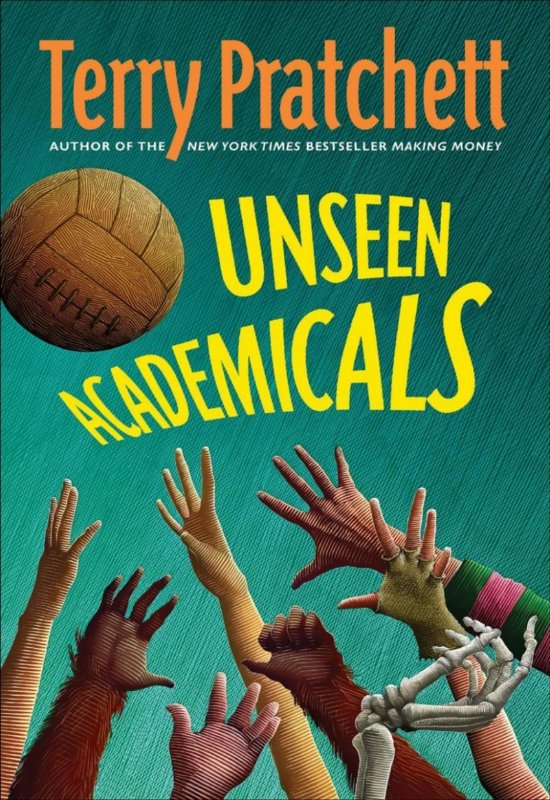by Terry Pratchett
Sir Terry Pratchett’s 37th Discworld book is about football and the important thing about football is that it is not just about football. Yes, there is football in the book, whether the medieval violent scrum with optional ball, or the more modern game with compulsory ball and optional violence; but there is also love, passion (not always the same thing), pathos, and satire.
Like the game, the story is one of two halves. Above the stairs the wizards are faced with a choice between playing a game of football or losing a valuable bequest, forcing them to cut back to only three meals a day. Unfortunately football is not the (relatively) genteel game we know today, but the ancient version of an organised riot. Fortunately for them, mystical forces are afoot and the goddess Pedestriana, via Lord Vetinari among others, is moving to bring the beautiful game back to a more civilised and organised form.
Below the stairs we have Glenda - ruler of the night kitchen and baker of pies, her friend Juliet – simple kitchen assistant yet destined to be the disc’s greatest (or first) fashion model, Trevor – expert dribbler of tin cans yet forsworn football after it claimed his father’s life, and Nutt – expert dribbler of candles, goblin, and with such a mysterious past that even he does not know it. Trevor and Juliet are star-crossed lovers from two rival footballing houses who have to overcome both their family’s prejudice and their own, Glenda must protect Juliet in her career transition as well as the football of the masses from the interference of the nobility, and Nutt must find out who he really is plus train the wizards to a point where they can not only win the football game but survive it.
 |
| (c) Paul Kidby |
Whether it is because of his age and condition or despite it, both Terry Pratchett’s writing and his characters themselves are maturing. Once the wizards were the source of a constant stream of farce and lampoon, now they are grownup and reasonable (though still eccentric). Rincewind even runs in the right direction occasionally. Lord Vetinari, once an enigmatic cipher now has more depth and humanity, though strangely seems the less for it. Some of the characters, like Juliet, are not particularly rounded, but that is deliberate (and matches her physique). Others, like Glenda, are well rounded (in both senses). The silliness of old has (in the most part) been replaced by quality characterisation. It’s right that some characters, like Pepe the knife-wielding fashion designer or the passengers on the bus to Sto Lat, don’t quite ring true, but most work very well despite the change of voice in so many old friends.
Contents aside , there are a couple of things amiss with the cover (well, the UK cover). Trevor Likely is wearing a wizard’s hat (he is only University staff), Nutt appears to have two legs on one knee (ok his race was originally made by Igors, but that is not right) and is the wrong colour, and it was the Dean not Vetinari as the referee. Still, it would not be a Pratchett (never mind a fantasy) cover without some mismatch with the text. It’s still a good picture though and Paul Kidby’s covers are more appropriate than the Josh Kirby ones.
This is not a bad book; Sir Terry is incapable of writing a bad book (as long as you ignore Small Gods and everything before The Colour of Magic), but this is not his best and the satisfactory ending is strangely lacking. Yes the wizards win the match because of Trevor and Nutt (bet you didn’t see that one coming), the various couples come to suitable understandings, and the bullies get their comeuppance, but the tying-up of loose ends is a little too glib. Maybe it was that divine intervention.
With his onset of alzheimer’s some are saying that it is all over for Sir Terry, but on the strength of Unseen Academicals he has got lots of extra time left.
Images copyright Paul Kidby http://www.paulkidby.net/






No comments:
Post a Comment